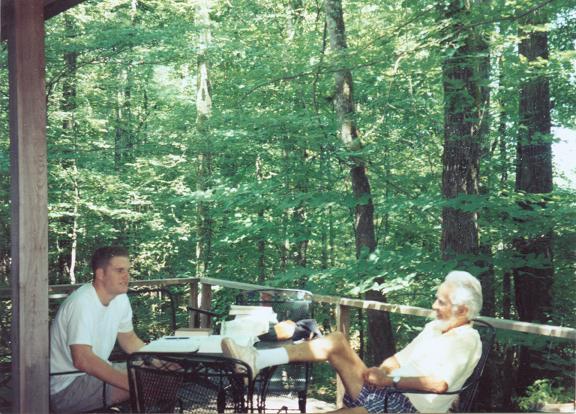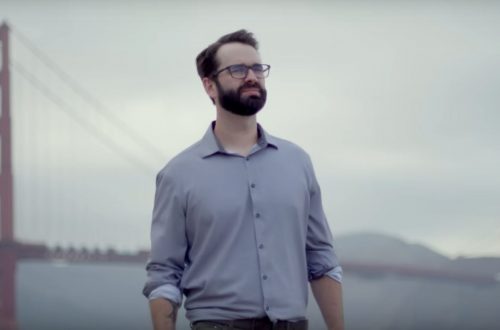
My Greek teacher Rev. James Lipscomb and I during one of our tutoring sessions at his home in Ruston, LA (circa 1994).
“What do college students do when they aren’t studying?†According to the Wall Street Journal’s Naomi Riley’s review of two books about college life, college students are primarily engaged in idleness.
No, they are not studying and going to class forty hours a week. They certainly are not becoming avid readers. Rather, they are in pursuit of the ideal represented in their ubiquitous watchword: “fun.†“Fun†includes among other things a great deal of binge drinking (often beginning on Thursday night and going through the weekend) and frequent casual sexual encounters.
This sad state of affairs comes as no surprise to anyone who’s been paying attention to the decline of university life over the last thirty years or so. We are no longer shocked by Jay Leno’s undergraduate “Jay Walking All-Stars†who don’t even know who the vice-president of the United States is. We simply assume that a significant number of undergraduates will be idle dead-heads who really don’t learn that much by the end of their seven years of college.
There was a time in the history of higher education in America when going to college meant going to get an education. To be an undergraduate student was more than merely hanging around old buildings with books in them.
My own undergraduate experience began with the same shiftlessness portrayed in Ms. Riley’s article (minus the partying and dissipation). Academically speaking, I was just there to get a piece of paper. Somebody told me I needed that paper, so I was there to get it. I had no clue about how an education could enrich one’s life and faith. But that all changed during my sophomore year.
During my second year in college, I entered into a profound crisis of faith. As a result of one professor in particular and a few other key influences, I came to doubt the reliability of the sourcebook of my faith: the Bible. It was as if someone had yanked the rug out from under me and I had no where else to stand.
But God used this spiritual and emotional crisis to drive me to a whole new perspective on Him and my education. In addition to being driven back to the Bible, I became blood-earnest about understanding history, philosophy, theology and all the other big worldview disciplines that have impacted Christianity over the centuries.
For me, it wasn’t an academic exercise, it was a matter of spiritual life and death to understand the Bible and where it came from, to understand the history of theology, and to think God’s thoughts after others who have gone before.
My love of the Greek Bible began in earnest during this period because I knew that I had to read this book for myself. I could no longer allow the secularists to tell me what the Bible is, what it is saying, and where it came from. I had to know God’s revelation for myself or I felt as if I would drown in the morass of conflicting opinions about it.
I’m not saying that everyone’s experience should be like mine or that everyone should go to college so that they can become a New Testament professor. What I am saying is that an education is not coextensive with a piece of paper. Many people with the piece of paper don’t have an education.
An education relates to how we view the mind that God has given us. Are we going to be passive receptacles for the world’s tripe, or will we discipline ourselves for the glory of God to learn about Him and the world in which He’s put us? An education is not just about knowledge (though it certainly includes that!), but it is also the formation of our character under God and the shaping of our minds according to a biblical worldview.
I fear that the majority of what passes for undergraduate education today is very far from such an ideal. May God allow us to see this tide turned in our generation for the glory of God.
(For more on philosophical and theological roots of the current crisis, see my review of George Marsden’s The Soul of the American University: From Protestant Establishment to Established Nonbelief.)




11 Comments
PaulinTexas
Denny,
What college are you a professor at?
PaulinTexas
Speaking of jay Leno, here’s a link to watch.
http://thoughtsonthechristianlife.blogspot.com/2005/06/jay-leno-asks-everyday-americans-about.html
Denny Burk
Dear Paul,
Thanks for the comment. I’m at the Criswell College in Dallas, TX.
Denny Burk
Barry Joslin
Denny – Good blog. If my Greek, Hermeneutics, and Theology students studied as much time as they spent being idle, then their education would mean so much more. Your put your finger on it.
Thanks,
Barry Joslin
Boyce College
Louisville, KY
Mark Redfern
Denny,
Working in public middle school, I see the tragic affects of the “knowledge is salvation” worldview that permeates American education. Education is not valued, and is seen as a necessary evil, even in collegiate settings, and as a means to getting something else, with the ultimate end being fun. A degree to have fun. Going to 8 subjects a day and then go home and have fun. The value is lost. You are so right, Denny. May God ignite a passion and love for His world and Himself. Ultimately, it took my conversion to begin to place a value on education, and I assume it will also take that for others.
RosieBoo
Excellent post, Denny. It’s great to hear about your struggles in college and where God has brought you as an encouragement to others. You are my favorite professor! 🙂 Ok, don’t tell Barry that, but until he gets a blog…. 🙂
Hoodlum
Man what an old pic – you sure are a lot fatter now. HA HA!
Barry – he put his crooked index finger on it all right. Lipscomb would be proud to read this blog!
PaulinTexas
Denny,
What do you teach at Criswell?
Denny Burk
Paul,
I teach New Testament, Greek, and Hermeneutics.
Denny
sofyst
What does he teach? He teaches sophists…:)
jigawatt
My wife (then girlfriend) and I went to Mr. Lipscomb for Koine Greek tutoring when we were undergraduates at Tech back in 2000-2001. I’m indebted to the good teacher for not only introducing me to NT Greek, but even more for providing great Bible teaching during that (rather difficult) time when I was just being introduced to the doctrines of grace.